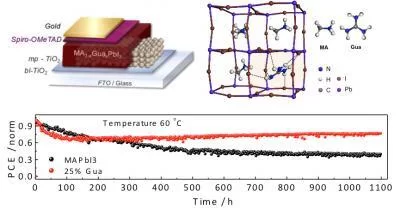
The lab of Mohammad Khaja Nazeeruddin at EPFL Valais Wallis, with colleagues at the University of Cordoba and the Helmholtz Institute in Berlin, has discovered that they can improve the perovskite stability, overcomewhat is known as the “Goldschmidt tolerance factor limit.” This is an indicator of the stability of a perovskite crystal, which describes how compatible a particular ion is to it. An ideal Goldschmidt tolerance factor should be below or equal to 1; guanidinium’s is 1.03.
The study found that adding guanidinium significantly improved the stability of the perovskite while delivering an average power conversion efficiency over 19% (19.2 ± 0.4%) and stabilizing this performance for 1000 hours under continuous light illumination, which is a standard laboratory test for measuring the efficiency of photovoltaic materials. The scientists estimate that this corresponds to 1333 days (or 3.7 years) of real-world usage.
“Taking a standard acceleration factor of 2 for each ten degrees increase in temperature, an acceleration factor of 8 is estimated for 55 °C as opposed to 25 °C degrees,” said Professor Nazeeruddin. “Hence the 1000 hours at 55°C equivalent would be 8000 hours. Our cells were subjected to 60°C, therefore the numbers could be even higher. Assuming the equivalent of 6 hours full sunlight/day, or 250Wm-2 average irradiance (equivalent to North Africa) the total number of days is 1333, equals to 44.4 months and 3.7 years stability. However, for the standard solar cell accreditation, a series of stress tests including temperature cycling and damp heat are also required.”
Read More: Perovskite solar cells stabilised at 19% efficiency

